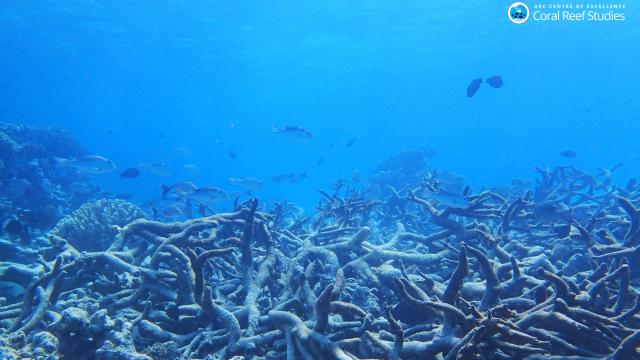Whether its humanity or coral, you need a healthy, diverse population to survive. Pick off the old and you lose wisdom and protection. Pick off the young, and it’s adios to the next generation.
When it comes to the Great Barrier Reef, climate change is wiping out everything indiscriminately. In a shocking new study published Tuesday in the Proceedings of the Royal Society B, Australian researchers released a census of Great Barrier Reef coral colonies. Across all ages and almost all locations, coral populations have declined precipitously in the past 20 years. That indicates the reef could be entering a new shrunken and unhealthy state or face collapse altogether.
The eulogy for the Great Barrier Reef has been written in the pages of journals, coral bleaching maps, and eerie photos of coral graveyards. Extreme ocean heat has subjected the reef to repeated bleaching events that break the symbiotic bond between coral and algae, including one this year. The new findings add yet another page to the chronicle.
“To know how coral populations will recover from these mass mortality events, we need to learn more about their composition,” Andreas Dietzel, a coral researcher at the ARC Centre for Excellence for Coral Reef Studies at James Cook University who led the study, said in an email.
He and other researchers took a population-level view of coral colonies along a 1,609 km stretch of the reef. They looked at both the crest of the reef just a few feet under the water and the slopes that go a bit farther beneath the surface, examining the abundance of large, medium, and small corals. The findings show total coral coverage dipped 41% on average compared to the mid-1990s across all the sites they sampled along the crest.
But the real shock is how much large coral has disappeared, particularly in the northern and central parts of the reef. In the middle section of the reef, large corals have all but disappeared at the sites sampled. Overall, large coral species declined by 76% from the mid-1990s. It should be noted the measurements don’t include data from this year’s bleaching event.
“This has severe ramifications not only for coral populations to recover from recent disturbances but also for their ability to provide habitat to fish and other reef organisms,” Dietzel said.
Small coral are also on the decline, basically vanishing from the north-central portion of the reef, as are middle-aged ones. Locations deeper beneath the surface, which are exposed to less hot water, are in relatively better shape, but the study also documented widespread coral declines on the reef slopes, too.
It may feel easy to brush aside yet another story of the Great Barrier Reef’s decline, because we’ve seen these warnings countless times over the past five years. But really I want you to stop and consider what this means. The Great Barrier Reef is 500,000 years old, and while it’s had a few near-death experiences, the current rate of heating today is all but unprecedented. In addition, overfishing and pollution are increasing the toll on the reef.
Findings published earlier this year show that widespread ecosystem collapse in the coming decades is possible, and the researchers pointed to the Great Barrier Reef as a prime candidate to die off if humanity doesn’t get its act together. Even in the best-case scenario, in which the world does cut carbon pollution, the new study offers a warning, noting that “the historical baseline of what constitutes the colony size structure of an ‘undisturbed’ population or assemblage has likely shifted on many reefs for decades, if not centuries or millennia.” In other words, we can fight to save what we can, but there are signs the damage is already done.
